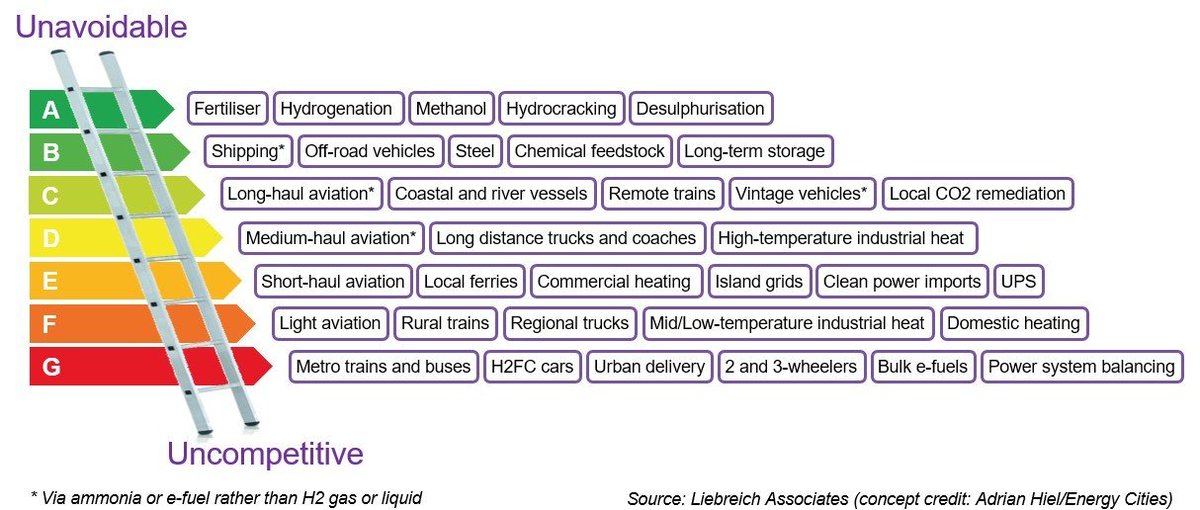
Hydrogen for heating is a distraction: inefficient, costly & resource-intensive. This is what ALL independent studies conclude.
My new peer-reviewed @Joule_CP paper reviews 32 independent studies. Not one suggests major role of hydrogen for heating.
🧵
authors.elsevier.com/a/1fq0e925JEJy…
My new peer-reviewed @Joule_CP paper reviews 32 independent studies. Not one suggests major role of hydrogen for heating.
🧵
authors.elsevier.com/a/1fq0e925JEJy…

1/ I systematically collected all studies on hydrogen for heating published since 2019 “not carried out by or on behalf of a specific industry (e.g. gas, oil, electricity, heat pumps, boilers)”. Result: 32 studies listed in the Supplementary Information. janrosenow.com/uploads/4/7/1/…
2/ The evidence assessment shows that the widespread use of hydrogen for heating is not supported by any of the 32 studies identified in this review. Studies included are by IPCC, IEA, McKinsey, IRENA, UCL, Imperial College, PIK, Energy Transition Commission and many more.
3/ The evidence suggests that, compared to other alternatives such as heat pumps, solar thermal and district heating, hydrogen use for domestic heating is less economic, less efficient, more resource intensive, and associated with larger environmental impacts.
4/ Last week another meta review of hydrogen studies by @FraunhoferISI was published corroborating my findings.
It finds that only 1-2% of buildings energy demand by 2050 will be h2 (including industry-funded studies) but <0.5% in @IPCC_CH scenarios.
isi.fraunhofer.de/content/dam/is…
It finds that only 1-2% of buildings energy demand by 2050 will be h2 (including industry-funded studies) but <0.5% in @IPCC_CH scenarios.
isi.fraunhofer.de/content/dam/is…

5/ There are many high-priority applications where hydrogen is essential. This includes replacing existing hydrogen use with green hydrogen (mainly fertilizer production), industry applications such as steel making, shipping, & long-term energy storage for electricity production.
6/ Appropriate use cases for hydrogen have been identified by others such as @AgoraEW @ETC_energy @IEA @IRENA with the @MLiebreich hydrogen ladder being one of the most intuitive efforts to organise thinking. 

7/ Efforts should focus on replacing current carbon intensive grey and black hydrogen first followed by other applications where few alternatives exist next. For heating, we have a multitude of alternatives already available and deployable today.
9/ An excellent article by the @newscientist @PhilippaNuttall here.
newscientist.com/article/233966…
newscientist.com/article/233966…
10/ 'Time to stop the fight' says @rachelparkes_ @rechargenews as 32 independent studies slam the widespread use of hydrogen for heating.
rechargenews.com/energy-transit…
rechargenews.com/energy-transit…
11/ The BBC points out that this study contradicts Rees-Mogg over hydrogen for heating.
bbc.com/news/science-e…
bbc.com/news/science-e…
12/ Canada’s federal hydrogen strategy includes blending hydrogen into the natural gas grid to heat buildings and homes. This article @NatObserver picks up the study on why heating with h2 is problematic.
nationalobserver.com/2022/09/27/new…
nationalobserver.com/2022/09/27/new…
14/ An interesting turn of events.
https://twitter.com/janrosenow/status/1575226843304980480?s=20&t=iwBz5tuR5QBhdiwdcuKU9Q
• • •
Missing some Tweet in this thread? You can try to
force a refresh











